|
If you're a fan of old-school John Woo, there's a better-than-good chance you discovered him through what became known as his Heroic Bloodshed crime-thrillers, rightly revered titles such as Bullet in the Head, The Killer and Hard Boiled. Some may have come to these retrospectively via his later Hollywood output, which for my money doesn't come close to those earlier Hong Kong titles. Indeed, the news that he is currently working on an English-language remake of The Killer fills me not with excitement but a groaning sense of dread, despite the admittedly intriguing rumour that the lead characters are to undergo a gender-switch. That's not to say that it won't be a decent remake, but the original was a goddamned masterpiece, and one thing it absolutely doesn't need is a slickly polished (and doubtless CGI-assisted) English-language makeover.
If you've dug a little deeper into Woo's backstory then you'll doubtless be aware that he began his feature career in the 1970s directing martial arts movies that were a task-and-a-half to track down back in the VHS days, and even when we all made the move to digital, most remained elusively unseen in the west. Two exceptions were the 1976 Hand of Death and the 1979 Last Hurrah for Chivalry, both of which were released on DVD in the UK in 2007 on Contender's Hong Kong Legends label as 'Ultrabit' titles, discs that included little in the way of special features and instead used all of the available disc space for the movie so that it could be transferred at the highest possible bitrate. The results were impressive, but with HD now the standard, what was really needed was a new restoration and a 1080p remaster of both films. Enter Eureka, who over the past couple of years have released a number of martial classics on Blu-ray in new restorations, titles I'd normally have reviewed with some glee had not so many of these releases fallen victim to problematic developments in my private life.
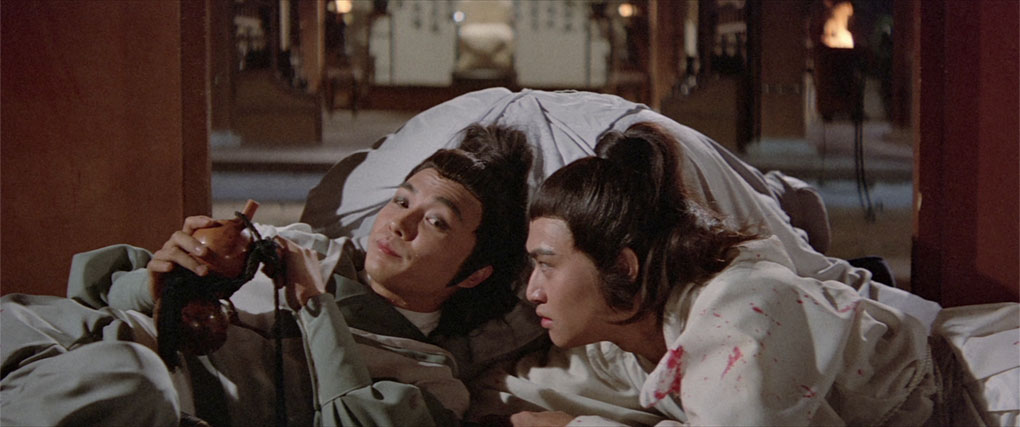
Both of the films in this 2-disc set are of considerable interest, not just as hugely entertaining martial arts actioners, but also for the foundations they laid for the distinctive John Woo films to come. Both feature faces that will be familiar to genre fans and both are peppered with distinctive and recognisable John Woo elements and touches, particularly Last Hurrah for Chivalry, whose mysterious failure to set the Hong Kong box office alight marked the end of Woo's martial arts film period and saw him temporarily reassigned to making comedies in Taiwan. Then in 1986 he was hired by the great Tsui Hark to direct a little something called A Better Tomorrow, which led to… well, you know the rest. So how do these two early works from once of Hong Kong's most revered action directors hold up, and how do they look and sound on Blu-ray? I'm glad you asked…
In 1970s martial arts cinema there were few crimes worse more heinous than betraying the Shaolin temple in which you trained, but killing your former master and most of his students would certainly qualify. It's not the greatest of plans. Strategically, it achieves precious except make the instigator feel like a big man for a while and you can bet your life that despite your best efforts, you'll never get all of the temple's disciples and if just one of them survives you can be sure that he'll dedicate the rest of his life to hunting you down an≠d opening an industrial-sized can of whoop-ass on you.
Such is the set-up for Hand of Death – aka Countdown in Kung Fu, aka Shao Lin Men – in which pure-of-heart Yun Fei (Dorian Tan) is charged with two crucial tasks, help a courier named Zhang Yi (played by director John Woo) transport a map that will aid forces rebelling against the repressive Qing government, and hunt down Shih Shao-Feng (James Tien), the former Shaolin pupil whose men were responsible wiping out almost everyone associated with the temple's teachings. It won't be easy. Despite Yun Fei's finely developed skills, Shih has developed a fighting technique known as Deadly White Crane Fist and has surrounded himself with a band of fearsomely trained warriors known as the Eight Tigers. The quest takes Yen Fei into an area known as the Foreign Zone, which he quickly discovers is hostile to nosey people and Shaolin priests alike. Here he encounters Tan Feng (Jackie Chan), a simple woodsman with a skill for honing weaponry and spear fighting and who harbours a personal grudge against two of Shih's cronies for murdering his brother.
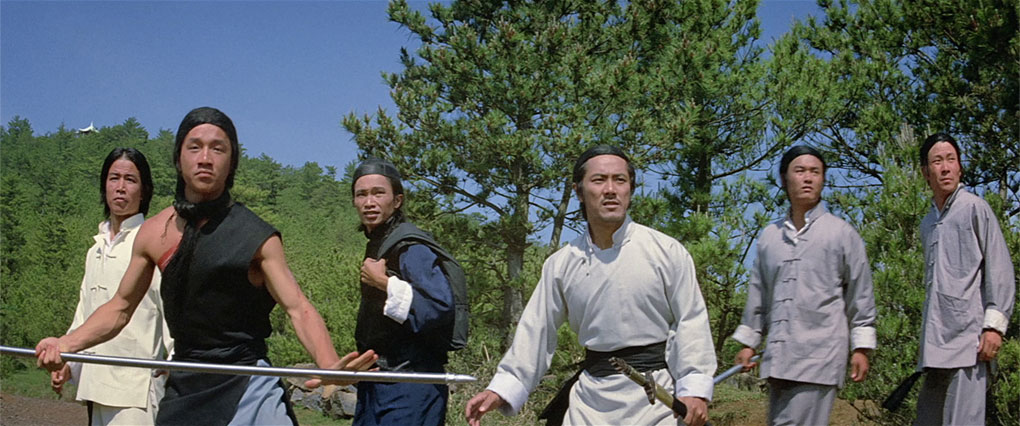
Up to this point the plot holds few surprises, at least for anyone with even a passing knowledge of a genre in which narrative invention is not exactly commonplace. The performances, however, are surprisingly and pleasingly restrained, with the initial meeting of Yun Fei and Tan Feng an almost wordless encounter in which an understanding is reached through an exchange of looks and some telling facial expressions, although it should be noted that this has been interpreted by some as the first evidence of a gay subtext. I'm taking no sides on this one. The subtle nature of this exchange is all the more surprising when you consider that Feng is played by a young Jackie Chan, who here turns in here what may rank as one of the most impressively understated performances of his career.
From here on the narrative trips along in genre-familiar fashion, as Yun Fei and Tan go their separate ways and Yun Fei bluffs his way into Shih's compound and has to do spectacular battle with Shih and the Eight Tigers, a multi-stage fight that concludes with him being beaten and tied up, then hung upside-down and left alone to contemplate his folly. It's a predicament from which he frees himself due to some eye-watering bodily contortions and the timely arrival of Tan, who by chance was delivering wood to Shih's compound when Yun Fei was being sorted. After fleeing to safety they are joined by two eager Shaolin students, and in an excellent scene, Yun Fei recruits a flute-playing swordsman known as Jiangnan's Prodigal Son (Paul Chang), a man who also has a history with Shih and due to personal tragedy hasn't drawn his sword in over a year. That soon changes. It's worth noting that on the English language track this character is referred to as Zorro. Excuse me?
While Yun Fei trains up and develops a Tiger Claw move that just might work against the Deadly White Crane Fist, Tan Feng sets about reforging the Prodigal Son's sword and making sturdy weapons for himself and Yun Fei. That it's all building to a final confrontation with Shih and his men is clear from an early stage – what catches you out is how early this climactic battle kicks off, with the entire final 25 minutes devoted to a whole series of vigorously staged conflicts with a variety of weapons, including spears, swords, feet and fists.
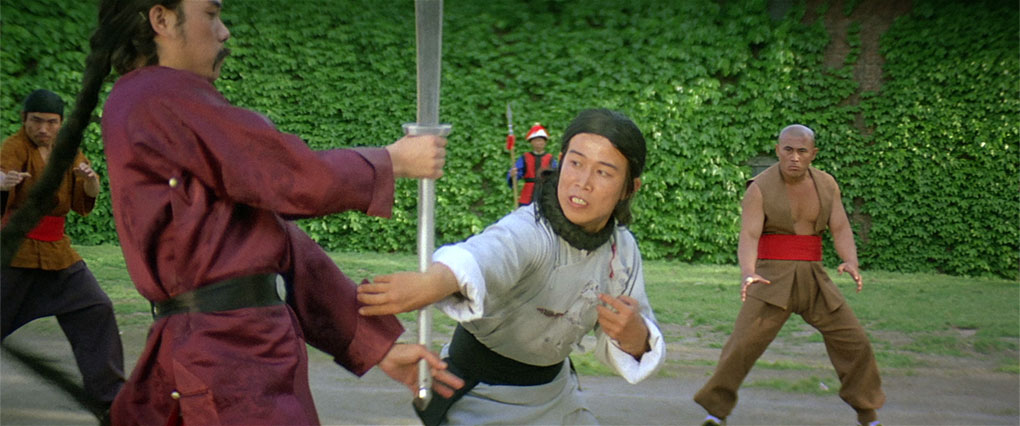
The cast is certainly a major draw here, with Yun Fei played by Dorian Tan, aka Tan Tio-Liang of Flash Legs fame, and a supporting cast that features Jackie Chan, Sammo Hung (who, as Shih's chief henchman Tu Ching is saddled with a distractingly large set of porcelain teeth), James Tien and Yeun Biao, and if you're confused by the on-film director's credit, know that Wu Yu-Sheng is John Woo's birth name and the one he worked under until 1977. And he's on terrific form here. Peppered with martial arts movie tropes it may be, but Woo still puts a distinctive stamp on the proceedings and in doing so foreshadows the films he would later become famous for, notably in the bond of trust and respect that unite the members of the Shaolin group, and the notion that life can really only find meaning in pursuit of a seemingly suicidal cause and that self-sacrifice in its name is the highest expression of honour.
Sammo Hung's fight choreography – or rather the performance of it – does vary a little in the early stages, with a few visible examples of rehearsal kung-fu (fights in which the blows carry little force and clearly don't make contact) in the opening assault on the temple. But once the story gets under way the battles are often blisteringly staged, particularly when Chan, Tan, Hung or Chang get to let rip, and the final 25 minutes of almost unbroken action should be enough to put a beaming smile on any genre fan's face. It's worth noting, however, that despite having a prominent role for Jackie Chan, Hand of Death is not what you'd call a Jackie Chan film, and if you come to it with that expectation you're likely to get fidgety waiting for him to let rip, though when he does so it proves absolutely worth the wait.
There's a lot more to Hand of Death than I originally credited it for when I first saw it back in 2007, and it absolutely stands out from the crowded genre output of its day in the busy nature of its plotting and – Sammo's teeth aside – the unusual restraint of its performances. The fights are numerous, varied and vigorous and the final 25 minutes is a non-stop parade of smartly staged action. It even breaks with genre convention with a bit of nudity and the inclusion of a (very) softcore sex scene. How was this not a box-office hit?
The splendidly titled Last Hurrah for Chivalry kicks off in familiar martial arts movie manner when the wedding party of Kao Peng (Lau Kong) is invaded by his father's nemesis Pai Chung-Tang (Hoi Sang Lee) and his ninja-dressed goons, who leave Kao injured and give his men a serious pasting. Kao wants revenge, but his master assures him that he's not up to the job. A hunt thus begins for a suitable fighter and one is quickly found in the shape of good-natured stable worker Chang San (Wei Pai), a former warrior uncomfortable with the reputation that continues to dog him. These days he prefers to use his considerable skills to punish rudeness or minor injustice, and otherwise spends his time caring for his sick mother, listening dreamily to the music played by local courtesan Sau Sau (Bonnie Ngai), and smacking up his sister's boyfriend for saying he won't marry her. He's not really interested in working as a hired fist, but he and a freelance assassin named Tsing Yi (Damian Lau) are pulled into the fray when a mysterious swordsman directly challenges them and kills a few more of Kao's men as a persuasive nudge.
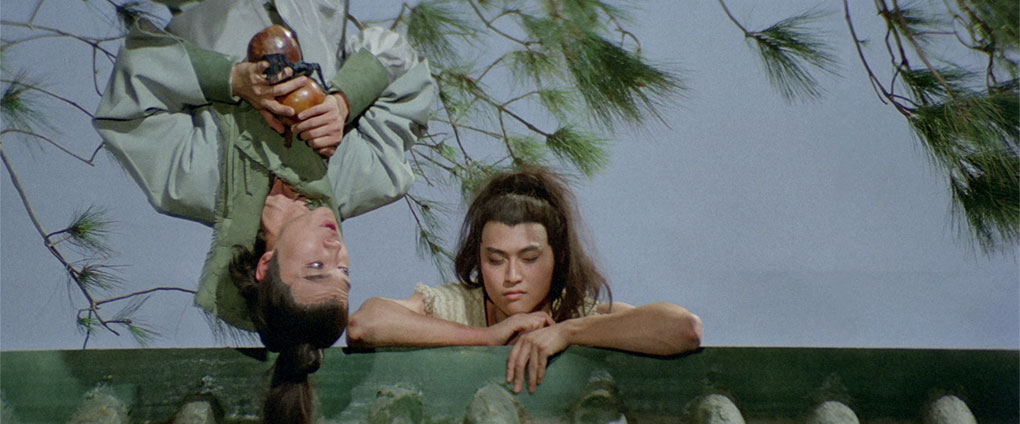
If you're not keeping an eye on the clock (and you won't be), then much of Last Hurrah for Chivalry appears to play out to generic expectations, from the opening assault to the search for warriors and the challenge that takes us into the final act. There's even the expected climactic battle, an extended one-on-one fight in which the good guy rediscovers his past skills and narrowly defeats his enemy with a particularly well-timed move. There's just one thing – at this point we're only halfway through the movie. If you hadn't realised already that this is more than just a standard martial arts film, you'd certainly know now.
Even in the first half there are signs that Woo is deviating from a usually rigid generic norm. The first meeting of Chang and Yi is particularly memorable. As Chang loafs on a rooftop overlooking a brothel garden enjoying the Sau Sau's music, Yi falls unexpectedly into shot, dangling upside down from a tree branch on which his leg is tangled and seemingly bemused by his location. The unfazed Chang then uncorks the wine bottle hanging from Yi's body and pours some of its contents into the grateful Yi's mouth, and the two strike up a casual conversation in a sequence that genuinely borders on the surreal. It turns out that Yi is not only a boozer of heroic proportions but Sau Sau's sweetheart. It's something of a one-way romance, however – she's clearly in love with him but he divides his time between killing for cash and drinking like a dehydrated alcoholic fish. As with Chang, there's the suggestion of a darker past that is never explored or explained. It doesn't need to be.
Once we move into the second half, fans of Woo's later action thrillers will soon feel at home, as Chang and Yi repeatedly cross paths and strike up a friendship based on mutual respect and later launch a two-man assault on Pak's heavily defended compound. At one point they pause during a momentary break in the fighting so that they can briefly discuss tactics and Yi can throw another drink down his throat, and you could almost be watching The Killer but with swords instead of guns. Last Hurrah for Chivalry is not just a pointer to the Heroic Bloodshed movies to come, it absolutely is one of them, in the teaming of Chang and Yi and their battle against seemingly impossible odds, in the bonding of two killers through a common cause, in the importance of honour in an otherwise corrupt world, and in the betrayal of those beliefs for money and power by the unworthy. Technically the way forward is also signposted, with a blizzard of splendidly choreographed and briskly performed action sequences and some handsomely shot slow motion that is integrated into the action as smoothly as Peckinpah at his best. The extended final confrontation also prefigures the later Wuxia films with the sort of gravity defying wirework that was eventually to become a generic norm.
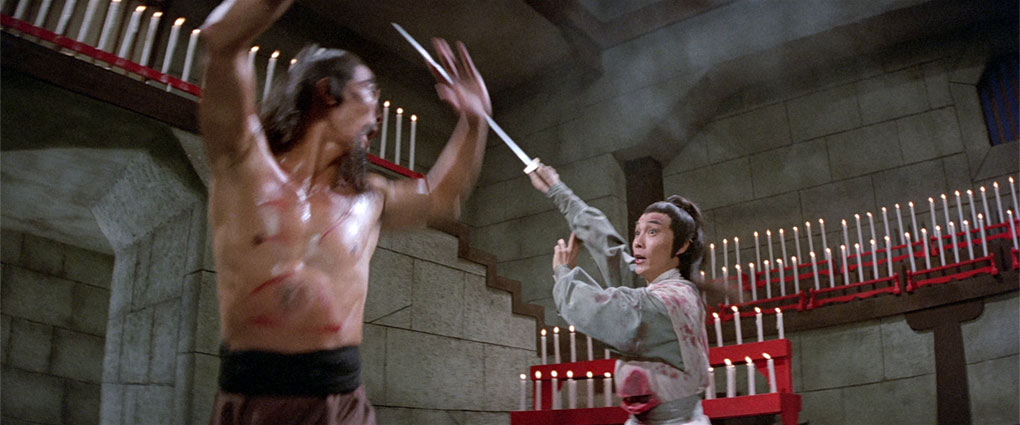
One particularly enjoyable aspect of the film is how well its comedic elements are incorporated into the drama, with the knockabout silliness that characterises and sometimes blights many kung-fu comedies discarded for a more character-based approach and an engaging eye for the oddball. Yi drinking a flask of wine and then smashing the bottle on his own forehead may have an Animal House vibe but it turns out there is peculiar purpose to his actions, while a fighter who employs a style known as Sleeping Buddha Kung-fu, in which acrobatic combat is interspersed with brief narcoleptic cat-naps, provides the film with its oddest fight scene, one that I can't help but suspect was an influence on a similarly themed comic battle in Stephen Chow's 1992 King of Beggars.
Last Hurrah for Chivalry has a plot density and dramatic gravitas that was almost unheard of in 70s martial arts cinema, but still delivers in spades on the action, with varied, energetically choreographed and long-running fight sequences (although briefly interrupted for some political intrigue, Chang and Yi's assault on Pak's fortress runs for almost a quarter of the film's length) and a nice line in offbeat character humour. That these various elements all work so well is one thing, but that they do so in such sublime harmony makes the film one for genre devotees to savour. But it should also be considered essential viewing for all fans of John Woo's Heroic Bloodshed films, as despite the period setting and the swordplay, this is up there with the best of them.
The result of new 2K restorations, both films look absolutely glorious on their individual Blu-ray discs. The 2.39:1 transfers here both boast rich and vibrant colour, a striking (but not digitally enhanced) level of sharpness and picture detail, and beautifully balanced contrast that delivers rock-solid black levels that do not suck in any of the surrounding picture elements. No damage is visible and there's hardly a dust spot to be seen anywhere. Hand of Death does have a small selection of shots in which the sharpness softens or the film grain dramatically increases (doubtless a victim of the condition of the source material), but the colours and sharpness really pop elsewhere and both transfers are so good that you'll have no complaints.
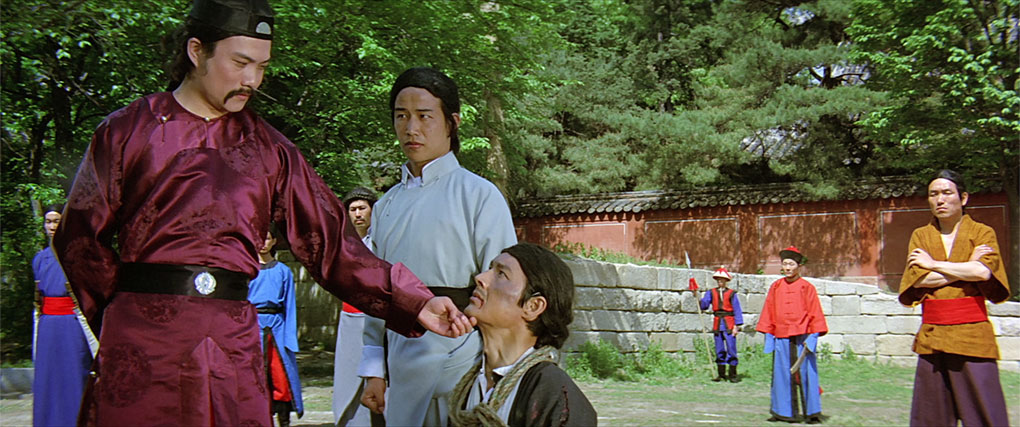
When it comes to the soundtracks, you've got quite a bit of choice as there are four on Last Harrah for Chivalry and five on Hand of Death, all of which were post-dubbed and thus don't quite match the mouth movements of the actors. All appear to be free of serious damage.
On Hand of Death we have the following:
- Mandarin stereo – clear but with range restrictions and a treble bias which is especially evident in the dialogue, and a slight background hum/hiss (it's somewhere between the two)
- Mandarin mono – this one has a very narrow dynamic range, with tinny and hissy dialogue and little in the way of audible background sound
- Cantonese stereo – the dialogue is a lot less hissy and the music less abrasive than on the Mandarin mono track and it has more bass, but never sounds remotely like it was recorded on location (it wasn't, but…)
- English stereo – the dialogue is clear but has a small touch of reverb wherever the scene is set and the music is clear, if range restricted, through there is a slight background hum/hiss on this one
- Classic English dub mono – I'm guessing this the track that accompanied the film on its arrival in the west and it's pretty rough, with painfully tinny dialogue and effects and hugely range-restricted music – it is rather fun though
On Last Hurrah for Chivalry there is the following:
- Cantonese stereo – a little range-restricted on the dialogue and effects but the music sounds okay
- Cantonese mono – similar to the above but a tad less clear, something especially evident in the music
- Mandarin stereo – similar in quality on all fronts to the Cantonese mono
- English mono – range-restricted voices and effects and the music is a tad less vibrant here
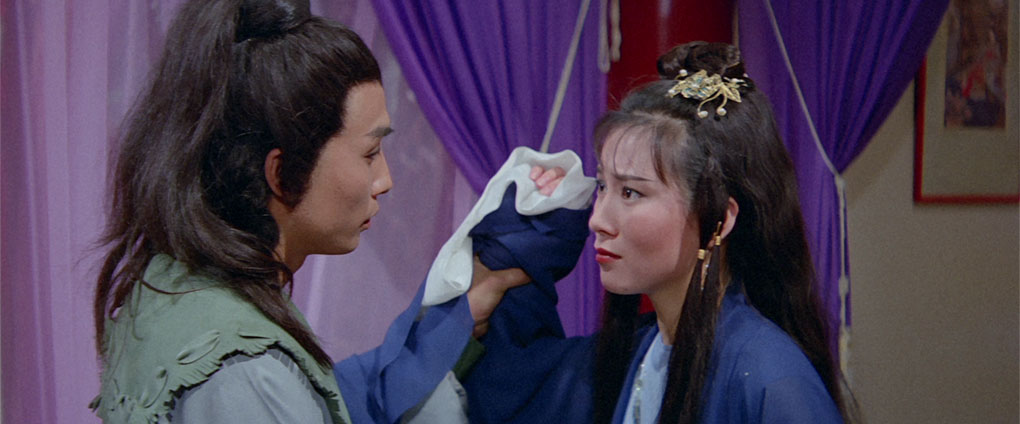
As is often the way with 70s martial arts movies, there are some differences here between the English dub and the subtitle translations of the original Chinese dialogue tracks. Indeed, I wouldn't mind betting that that the Cantonese and Mandarin tracks – both of which would have been post-dubbed – also differ from each other in their wording, with dialogue modified to suit the silently recorded mouth movements of the actors (they still don't, of course). If you want to have a little fun with this, try running the film with the English language track and English subtitles simultaneously enabled and you'll soon see what I mean. As an example, here's a line delivered by Sammo Hung from Hand of Death, where even the two English language tracks differ from each other:
Stereo English track: "What? Damn! How dare they!"
Original mono English track: "What's that? Goddammit! They've got a nerve!"
English subtitles: "What? Fuck! How brazen!"
It's worth noting that the word "fuck" makes a fair few appearances on the English subtitles when characters get angry or frustrated, and it's a word I can almost guarantee there is no local equivalent of on the original Cantonese or Mandarin soundtracks. This irritating habit of swearing up the translation for a modern western audience is one that I first encountered on an American DVD of Kitano Takeshi's Sonatine, though the fact that this disc was released on Quentin Tarantino's Rolling Thunder label may just have had something to do with that.
Audio Commentaries on both films by Mike Leeder and Arne Venema
Both films feature commentaries by Hong Kong-based actor, producer and martial arts film expert Mike Leeder and filmmaker and film historian Arne Venema, and before I get into specifics of these tracks I need to note one thing that both Camus and I have fallen foul of that has reared its head again here. We both tend to write our reviews of the films that we cover before watching the special features, in part to avoid having our views influenced by others who may have a different relationship with the title in question. Every now and then, the content of these extras has us banging our heads against the table, primarily because points we have painstakingly made in our reviews are repeated almost verbatim on the commentary or in the accompanying booklet, which makes it look as though we've simply lifted this part of the review from the extras, which is never the case. There is some inevitability to this, as something that strikes one (re-) viewer is likely to also prompt a similar reaction in others, particularly those well versed in a particular filmmaker's work. But when the exact same observations are made and expressed in similar wording in the extras, the temptation to scrap what you've written and do a frustrated rewrite is a lot stronger than you might think. I should note that this is not the first time we've added a codicil like this to one of our reviews, and I've lost count of the times I've gone through the extras and then returned to my review to add, "as so-and-so says in his commentary track on this disc" to a comment that I've heard or read repeated when I got to the special features. Such is the case here, especially when it comes to Leeder and Venema's comments on the relationship between these films and Woo's later Heroic Bloodshed movies. Again this is inevitable, as if you know the later films then this connection is nigh-on impossible to miss, but there are a couple of times when our observations are so similar that my review reads almost like a transcript of the commentary. I thus feel obliged to point out that the both of the reviews above are updated versions of ones I originally penned back in 2007 and that the comments in question were all made back then as well. Honest.
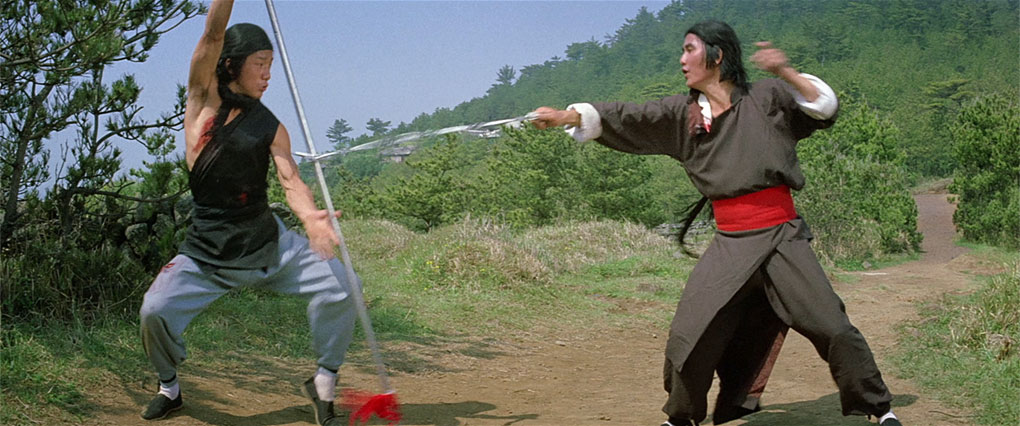
With that piece of self-indulgent piffle out of the way, I can confirm that Leeder and Venema's commentaries for both films are every bit as lively, entertaining and bristling with information as their excellent tracks for Eureka's Once Upon a Time in China Trilogy set. Leeder has also worked on a number of martial arts movies and with some of the genre's more notable performers and filmmakers, so is able to add a few engaging anecdotes about them to the mix. Between them, they deliver plenty of information on the actors and filmmakers, make a persuasive case for why these films differ from the genre norm, and despite being huge fans of both are not above good-naturedly poking holes in the shaky logic of either. As I noted above, they have quite a bit to say about how the foundations are being laid here for the Heroic Bloodshed films to come, and make the very same link to The Killer as I did above. They also make quite a deal of the supposed homoerotic overtones of both movies, something I initially took with a pinch of salt, though when it came to a sequence in Last Hurrah for Chivalry where Chang and Yi abandon Sau Sau and run through a garden together in slow motion with beaming smiles on the faces, I began to suspect that they may be onto something. A terrific pair of commentaries that should be considered essential companions to the films.
From Hong Kong to Hollywood: An Interview with John Woo (22:50)
A slightly misleading title for a featurette that, while based around an interview with Woo, also includes contributions from The Killer cinematographer Peter Lau and the leading man of the Heroic Bloodshed films, Chow Yun-fat, plus a string of film extracts that run for what far longer than is normal for such an extra. Woo talks about infusing his action scenes with emotion, the influence of Sam Peckinpah, Martin Scorsese and Jean-Pierre Melville, his childhood love of musicals and how his connection to Chow Yun-fat is partly due to similarities in their backgrounds. Be warned, this has been hoisted from a DVD release that was put out when producers of special features thought that interviews weren't interesting enough on their own and would suddenly and for no good reason duplicate the image into two windows – one in colour, one in cropped black-and-white – and set them against a fiery background. Man, was I glad to see the back of that shit.
An Interview with John Woo (15:17)
A more straightforwardly filmed (thank you) archive interview with Woo, who here focusses almost exclusively on Last Hurrah for Chivalry, which makes sense considering that's the disc that it's on. Subjects covered include his initial desire to make a gangster or samurai film but the studio's insistence on a "fist and pillow" feature (an amusing local term for a "sex and violence"), the reasons he wanted to make the film, staging scenes like those in classic Japanese samurai movies and giving others the rhythm of a musical or the look of a stage play, the political overtones of the villain, rewriting the script and more. Intriguingly, he at one point states that he doesn't feel like he exists in this world and is living in the past. He also, despite being discouraged by its box office failure, still has much love for the film itself.
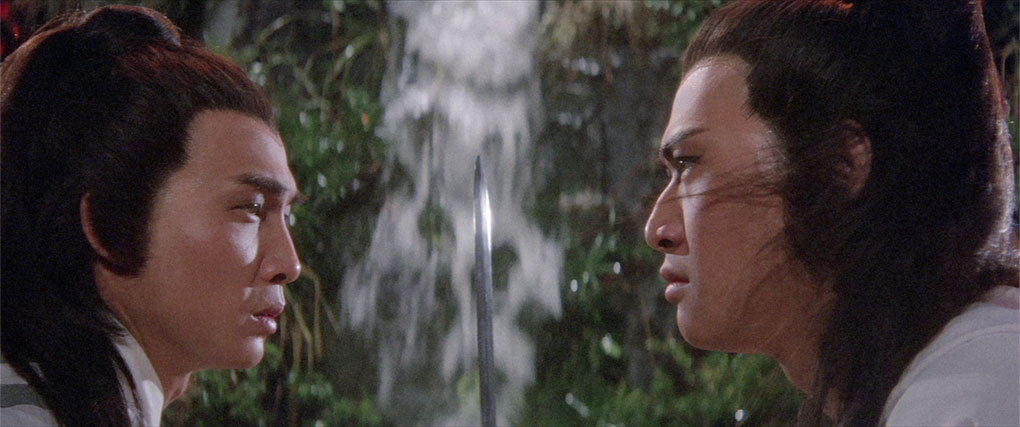
Hand of Death Original Theatrical Trailer (3:58)
A lively and nicely scrubbed-up print of the original Hong Kong trailer with lots of fighting and even a bit of nudity and sex, but no subtitle translations of the Chinese dialogue and narration.
Last Hurrah for Chivalry Theatrical Trailer (4:34)
A typically long Hong Kong trailer with no subtitle translations of the dialogue but bilingual text on screen, which describes Sau Sau as, "Beautiful! Wise! Unique!" Okay!
Booklet
Aside from the expected credits and promotional imagery, this booklet features two worthy articles. In the first, Matthew Thrift explores Woo's early career and apprenticeship under revered genre filmmaker Chang Cheh, before taking a more in-depth look at the making of Hand of Death and Last Hurrah for Chivalry, as well as touching on what makes the films special. The second is a reprint of a piece written by Asian film expert Frank Djeng originally used as liner notes for the Tai Seng laserdisc release of Last Hurrah for Chivalry, which consists of further details of John Woo's early film career and an interesting analysis of the film.
Revisiting these two films on Blu-ray has proved an eye-opening experience, one in which works that I had previously admired played more like the genre classics that some – including Mike Leeder and Arne Venema – regard them as. The restorations and transfers on this 2-disc Blu-ray set are glorious to behold, and while the special features are limited in number, the commentaries alone make this release special. If you're a fan of old school martial arts cinema, you need to own this set. Highly recommended.
|